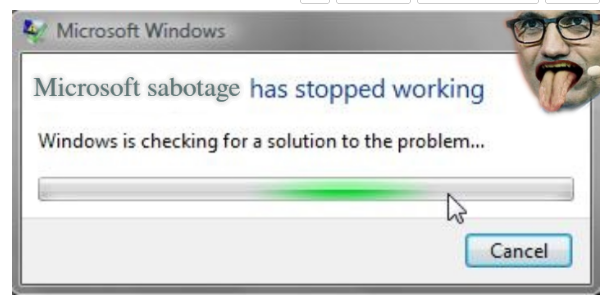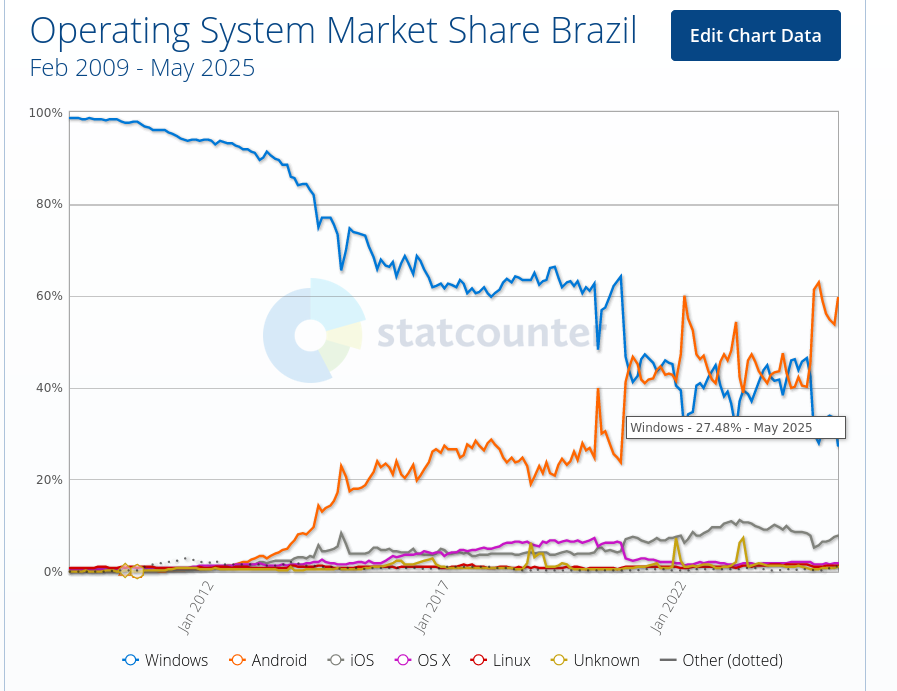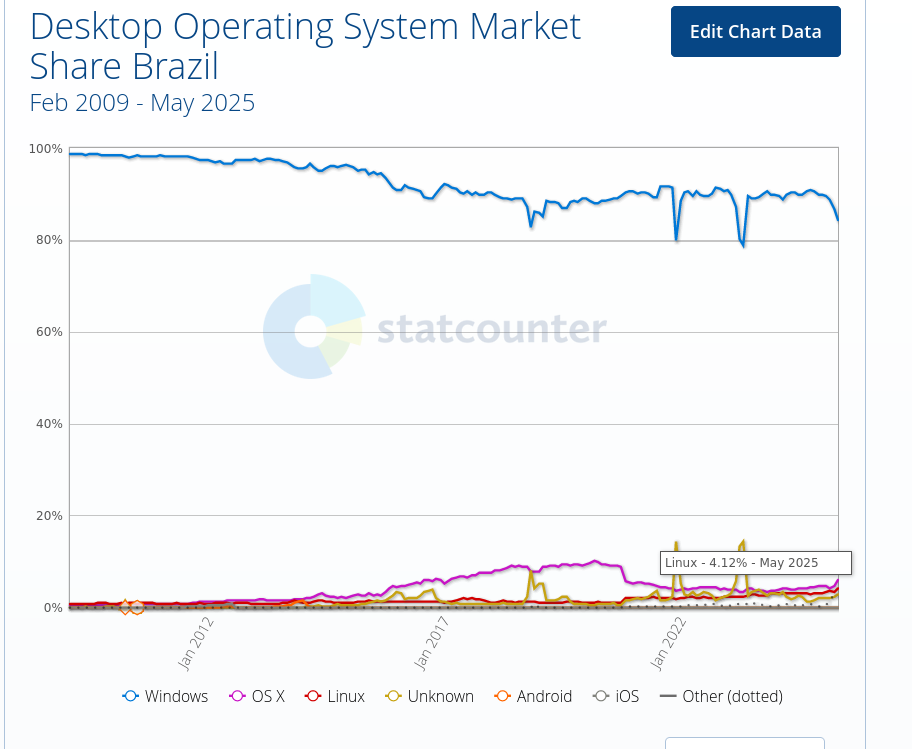Windows Down in the Largest Countries, Microsoft Cannot Dodge This Reality Forever
Talking about "clown" and "hey hi" (AI) - sometimes "Quantum" - is like telling bedtime stories to infantile investors who don't understand those buzzwords
In the coming days we'll debunk some false claims made by Microsoft. There were several Big Lies told and spread this past week. The media seems ever so eager to spread lies and never scrutinise the lies told for hype's sake [1, 2]. One very prominent example is only days old (IBM's debt exploding out of control while it falsely asserts it'll "invest" in the US more money than the company is "worth"). Singing lullabies to the Dear Leader and to gullible shareholders.
So how is Windows doing anyway?
"The top line number from Valve for the Linux marketshare is 2.27% for April," Phoronix notes. That's DRM and gaming, not the full picture. Windows used to dominate almost 100% of this market segment. And now? Even PewDiePie moves away.
As we showed yesterday, in the EU's largest economies GNU/Linux is up sharply. It's not just in Europe. Consider South America, including Brazil.
From February: statCounter: GNU/Linux Reaches New All-Time Highs in Brazil and Argentina, Android Has Reached 60% in South America
From March: GNU/Linux Reaches 5% in Brazil, an All-Time High According to statCounter
And this morning:
Moreover, it seems like in recent months Brazilians moved to GNU/Linux more than to Vista 11.
Microsoft without Windows cannot remain the size that it is now.
"I doubt anyone's going to want a $1500 Windows laptop with a $400-500 Trump tax on it," Ryan says. "So they're screwed. Most of those Windows laptops have notoriously bad firmware problems. They never seem to last long before Windows stuffs itself and you're lucky if you can even re-install it somehow. But then they cut off support unpredictably or make you update to some new version you don't want that has more bad stuff in it."
Microsoft leveraged UEFI to vandalise GNU/Linux PCs. It's gonna have to pay for it.
People are losing faith in laptops (or desktops) with UEFI. They don't trust what's happening.
"I haven't had a single UEFI system that's worked right," Ryan adds. "The firmware, that is. You can probably remove Windows if you try hard enough but some of the problems follow you over to Linux because they're part of the firmware. If you try to update the firmware, you're spinning the cylinder with one bullet in there somewhere, and that's the one that kills the laptop. So if it's not doing something absolutely unbearable *and* in warranty, you leave it alone. You can end up having so many more problems than you do by not upgrading it. My Chromebook just takes care of this for me, I don't even have to think about it. It does not use UEFI. I haven't had any real problems with this computer, which is probably the first time I could say that since PCs shipped with legacy BIOS, where like 9 out of 10 of those worked fine, and that's not so bad compared to UEFI."
All this complexity won't salvage the monopoly; it can urge people to flock to alternatives.
Ryan concludes with: "Legacy BIOS was even better, because you could just boot into FreeDOS and update the firmware there without any of those Windows Flasher things. Complete garbage. Windows freezes up and stutters around and you hope that the next thing that doesn't happen is that it just locks the last thing it printed to the screen, rev the fan up, and have the main board die. You can't do that with UEFI, boot to DOS and just do the update. So it's much much worse. If the only thing that the Macs and Chromebooks give the user is they don't have to deal with UEFI anymore that's almost worth everything else all by itself. Lots of things the Chromebook does are not absolutely insane (like Windows is) because they don't hire idiots and they haven't been around so long that their OS is full of "Because forty years ago..." And all that adds up, you know. In Windows it adds up."
Chromebooks are gaining this month. In some countries ChromeOS is now at over 10%. We named some in IRC.
Ryan comments on this: "I've run into so many things my Chromebook does (I have a plus model, so it's all decked out.) where I'm like "Oh cool! I'll bet people at Google made it do this because they actually use it and don't want to be annoyed all the time." I wonder if anyone at Microsoft actually uses Windows and just deals with all the firmware bugs, ransomware, OS stuffing itself at least once a year, running hot, you know all that. I don't think there's dogfooding at Microsoft. I think they go home and use something else from the looks of it. If you use your own product eventually you fix the things that annoy you and it doesn't do that anymore. There's a threshold where you encounter that problem so many times that you'll fix it just so that won't happen to you anymore."
Rupert Goodwins published the following 5 days ago:
Windows isn't an OS, it's a bad habit that wants to become an addiction
Think that next refresh is going to get better? The first step to freedom is admitting there's a problem
Windows is at that awkward stage any global empire has to go through. Around one in five of the world population is a Windows user – 1.5 billion humans. Aside from the relatively small slice that Mac takes, everyone else is happy with smartphones, so until we make contact with credulous aliens, there are no new worlds for Microsoft to conquer. In an industry obsessed with growth, this is untenable.
It gets worse. For almost all of the existing user base, Windows 10 is perfectly fine, so Windows 11 has to be forced down their gullets at gunpoint. You cannot have a fifth of humanity pinned like a moth collection to your desktop and not monetize them. This has led, as Dave Plummer notes, to an OS that's both tool and adversary, one that gives you AI whether you like it or not, and one that advertises and prods and pulls you toward paid services whether you like it or not. There is change for change's sake, and not for small change either.
[...]
Linux has a fetish for freedom that can still seem daunting, with a bouquet of options in an ecosystem that resembles a rain forest in its florid complexities. Pick a mainstream distro, preferably with a community of users you can get on with, and set about learning it. It will run on any old tat, although you'll do better with something swift, and it will never, never not ever, stick its feeding tube down your nose to pump in AI.
Are government bailouts Microsoft's last resort? Can that work at all? █
"Microsoft, the world’s most valuable company, declared a profit of $4.5 billion in 1998; when the cost of options awarded that year, plus the change in the value of outstanding options, is deducted, the firm made a loss of $18 billion, according to Smithers."
"They [Microsoft] have the deepest of pockets, unlimited ambition, and they are willing to lose money for years and years just to make sure that you don't make any money, either. And they are mean, REALLY mean."
--Robert X. Cringely



